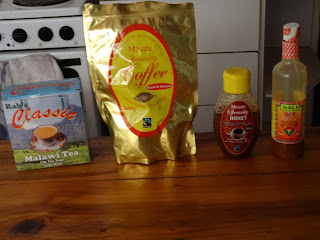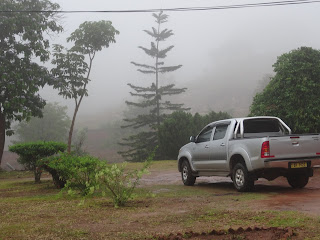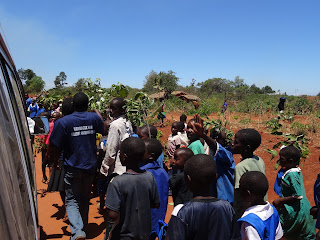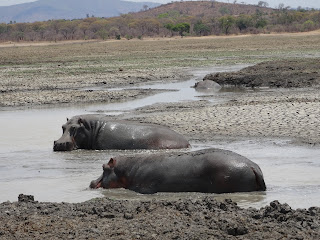I've now been in Malawi over a month and am starting to form some impressions of Malawian life. Of course these might change as I stay here longer but I thought I would set some of these down.
The first, which I referred to in one of my early blogs, is the friendliness of the Malawian people - the 'warm heart of Africa'. The warm welcoming handshake and smiles I got when I arrived. The children shouting out 'how are you?' to which I respond 'very well, how are you?', and they giggle between themselves (there's none of the 'don't talk to strangers' concern for children). The welcome we receive from locals when we go to events in the communities Temwa serves. The generally willing acceptance of people when you want to take their picture - a woman in the lush valley near where we live, a tailor mending the zip of Liz's waterproof, men firing bricks in Nhkata Bay, the children in Bigha playing with their trucks (although I made a mistake of taking a photo in the Swahili market without asking permission and got a negative reaction from at least one stall holder, so a lesson for me!).
 |
| Woman in the fields - it was getting dark so she came closer for me to get a better shot |
 |
| Tailor wasn't able to replace the zip so didn't want to charge for the stitching job he did |
Then there is a real and infectious sense of humour. Laughing a lot is part of this - James and Halord always in fits of giggles; the repartee and laughter whilst watching football matches at Red Chile. There is the dry humour of Wellington talking about what he is planning for his Sunday sermon as lay preacher at the Zion Christian Church; or UK volunteers being given Tumbukan or other local identities - I am now Musopole from Kameme in Chitipa District (the very north of Malawi near the Zambian border) and Liz is nya Kaunda from Nkhata Bay (so, of course, much more local than me!). There is also humour in adversity - for example, when our vehicle broke down and we were stuck well into the evening on my field trip to Kasasire; or when we were having difficulty getting our new generator installed and Jericho, the Micro-Finance project officer who was doubling up as an electrician, saying 'ESCOM [Electricity Supply Commission of Malawi] operatives are working tirelessly to get you electricity' every time he went past our desks.
 |
| The new generator... |
 |
| ...and its connection to one of our sockets! |
The influence of religion is huge. Everyone I have met and talked to professes themselves to be a practising Christian. And Malawians take their religion seriously. Meetings at work or in the field start and end with a prayer. Sunday services start at 7am to 7.30am in the morning and go on for three hours or more - and you can often hear singing coming from churches on other days. There is a huge number of different Christian sects - CCAP (the Church of Central Africa Presbyterian) seems to be the closest to what might be considered an established Christian church, largely as a result of Scottish missionaries' role in spreading Christian beliefs in this part of Africa. But others include Seventh Day Adventists, Pentecostalists, Zion Christian Church of Africa, Jehovah's Witnesses, Ethiopianist churches (which developed in the late nineteenth century and tried to reconcile Christian beliefs with traditional customs and beliefs) and so on. According to Wikipedia, 85% of the population hold Christian beliefs, with most of these Protestant but a sizeable minority (about 20% of the total population) being Catholic. The remaining 15% of the population is mainly Muslim and we have on occasions woken up to hear the sound of the call to prayer before sunrise wafting up the valley. Liz went to the Mzuzu Catholic church service on Sunday morning and said the church was packed. The service started at 7am but luckily was over by 9am - Catholics have a bit more of a set formula than Protestants and I presume that keeps services short!
The degree of adversity people face is very large. High infant mortality, low overall life expectancy, low levels of paid employment, low income, poor infrastructure, unpredictable weather events (late and heavy rains last December led to extreme flooding and destruction of crops) and so on. But people also find ways of coping and as a result there is very little public evidence of absolute poverty (hardly any begging) and a generally positive (or could be considered fatalist!) outlook on life in Malawi as reflected in a comment to me by a woman in a shared taxi that things may be bad but 'at least we don't have war or ebola'.
People seem to cope and seek to address the problems they face. The local industry/self-sufficiency I witnessed in Nkhata Bay last week - people firing bricks to make houses, mending their nets so they can catch - and sell - fish, making carvings and other artefacts that can be sold to tourists. The extraordinary array of vegetables, pulses, fish and other products sold in Mzuzu main market. The wonderfully tended plots and the range and impressiveness of vegetables and fruit people grow for themselves. The local Mzuzu products - honey, coffee, tea, and Nali (a top range spicy relish). The colourful Chitenge (a kind of sarong that women wear wrapped around their waist, particularly in rural areas, and is also used to carry babies on women's backs and as a head cushion to allow heavy objects to be carried on women's heads) for sale in the Swahili market. The commitment to develop new skills to create additional sources of income (for example, James, the watchman, is learning tailoring and has made a very fine shirt for Tom, one of the other volunteers, and will be making one for me from Chitenge material I bought at the Swahili market). The ingenuity and application people show in dealing with difficult issues - whether mending broken down engines or wiring up electric generators. The way in which I witnessed in Kasasire and Liz witnessed in Bigha local people engage with the issues they face and seek to address them as communities.
 |
| The well tended plots at the bottom of 'our' valley |
 |
| Greham brought two of these huge home grown cabbages into the office |
 |
| Vegetables at Mzuzu market |
 |
| Some local products - the Nali relish is particularly good |
And, whilst local newspaper headlines generally focus on issues that people commonly associate with poor governance - back-biting between political parties, corruption, poorly managed government projects and so on - there is some evidence of things changing for the better. At a national Malawian level, for example, whilst child mortality is very high - according to UNICEF, in 2013 the under one mortality rate was 44 per 1,000 live births and the under five rate was 68 per 1,000 live births (more than 10 times the child mortality rates in the UK) - this compares with much higher rates in 1990 - 143 and 245 respectively. And the way that Temwa and other local organisations try to support the development of sustainable communities in hard to reach areas like Nkhata Bay North should mean on-going progress in local people's quality of life.
 |
| The rains arrived!!! |
Getting back to life in Mzuzu.... The rains came earlier this year than last. There was a heavy downpour and thunder and lighting that seemed to last through the night on Tuesday. The rain and wind - mixed with a low lying mist - lasted throughout Wednesday and into Thursday. Julie, the AFID volunteer who is working for SPRODETA, arrived on Wednesday and it certainly seemed the case that she had brought the Scottish weather with her from Aberdeen. We're back to sunny hot weather now but we can expect more of a mix (which is certainly good for crops in Malawi so long as the weather does not get too severe). Power cuts are still very regular - at least two last week which lasted most of the day (it felt quite spooky being in Shoprite, the local upmarket supermarket, and suddenly finding yourself in the pitch black). I've been starting work on Temwa's 2016 budget and also developing our procurement policy (standard fare for me). Temwa has been in a period of intensive training and upskilling of staff, including financial management training carried out by Charles, the Finance and Administration manager, and motor-cycle training so all project and field officers can get out into the field on motor-bikes when cars aren't available or can't navigate the roads. Liz has been helping out at the Mzuzu Crisis Nursery which is close by and looking at what else she can do when she is here.
 |
| Temwa staff receiving training on financial management and personnel policies |
 |
| Project and field officers on their way to their motor-bike tests |
I've also got a confession to make. For those who thought I had developed superior photographic skills, I should let you know that all the photographs at the Bigha Mobile Testing Clinic event and most of those at the Kasasire Nkhata Bay Natural Way sensitisation event were by Elle, one of the other UK volunteers. So thanks Elle and apologies for using your photos without crediting you!
Liz and I are hoping to go back to the Lake next weekend (with Julie and Maria, Temwa's micro-finance business manager, who is putting up Julie during her stay). I'm also hoping to get to Usisya sometime ...it's the centre of our operations in the field and I haven't been there yet...























































